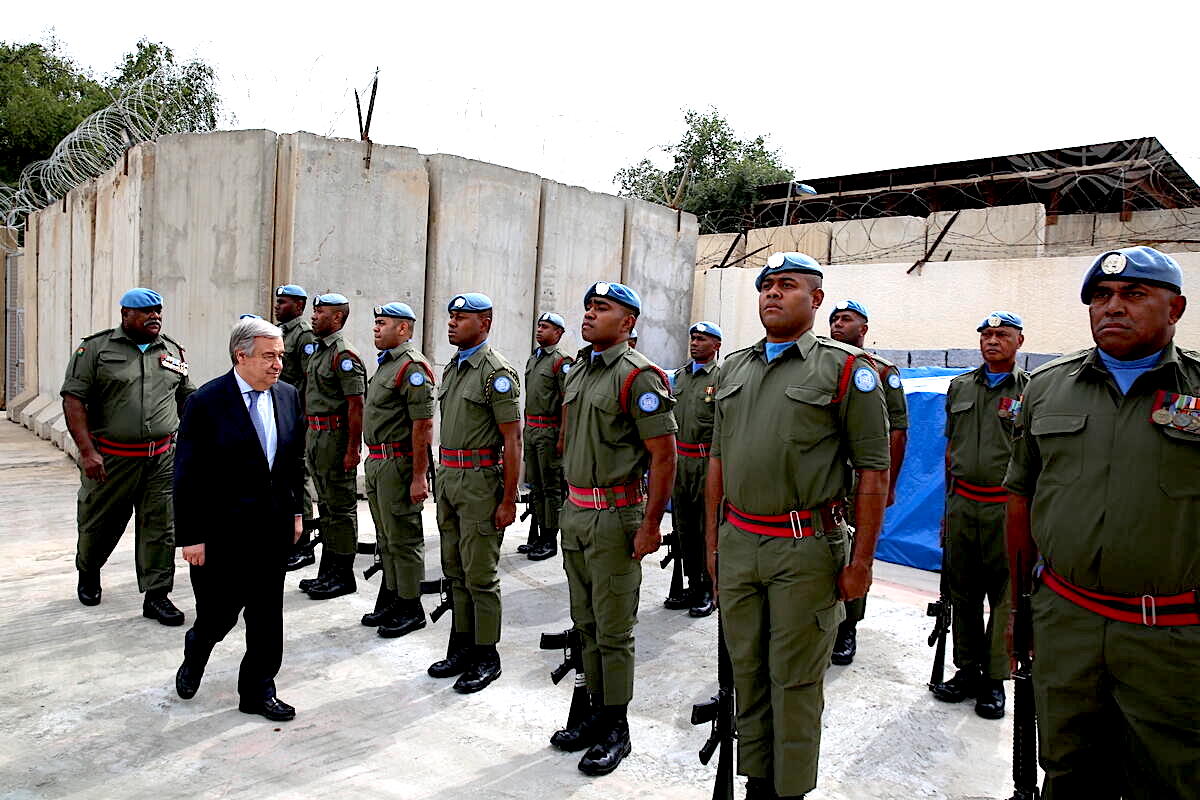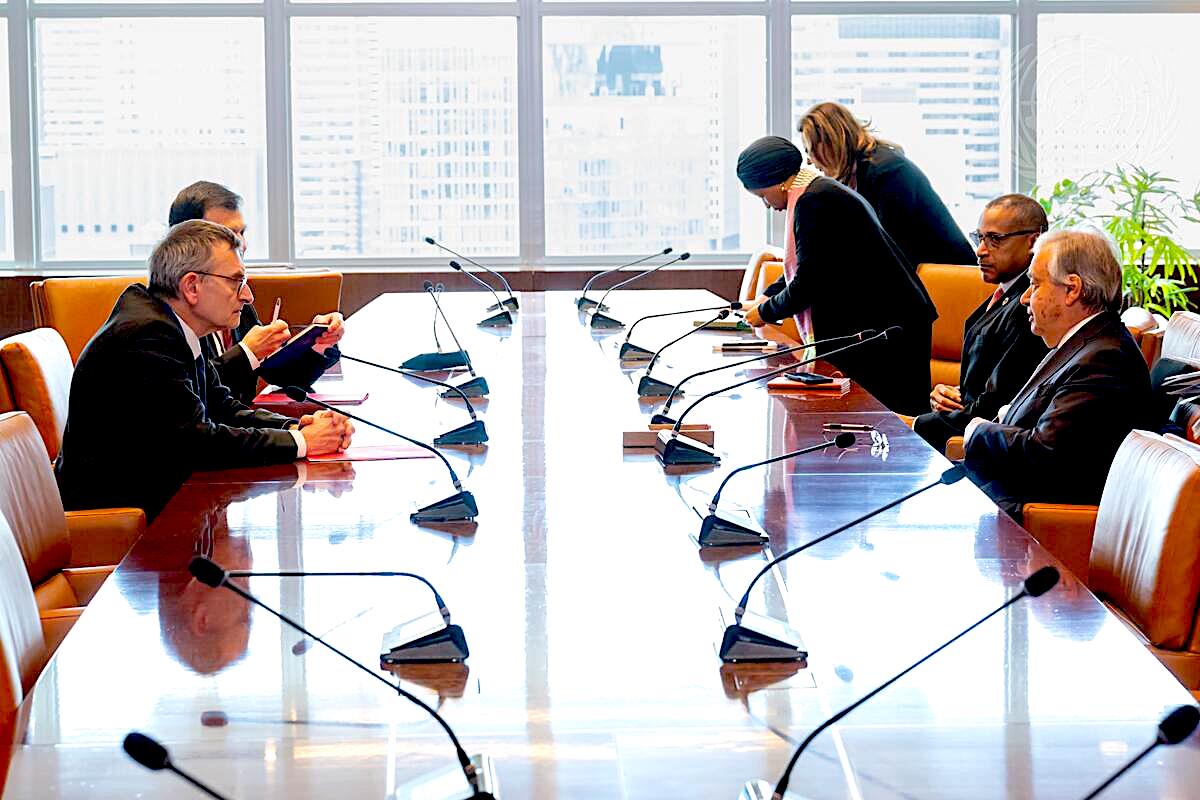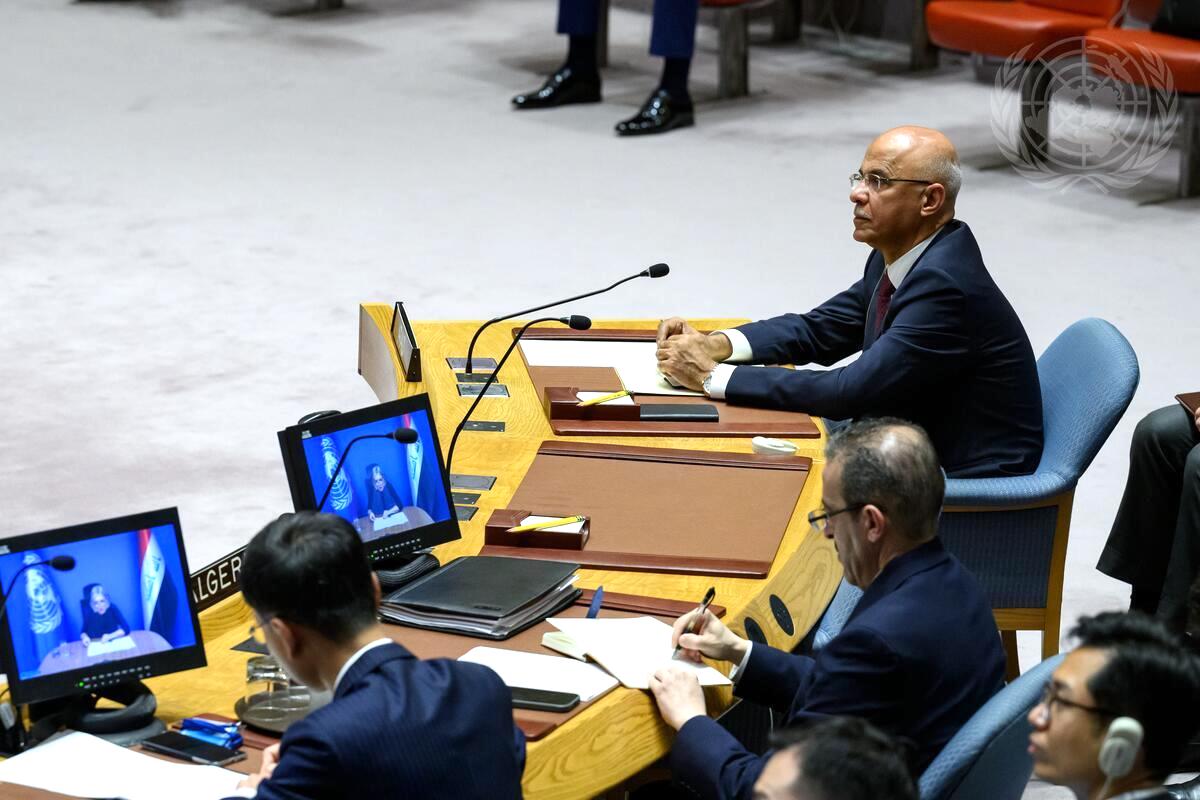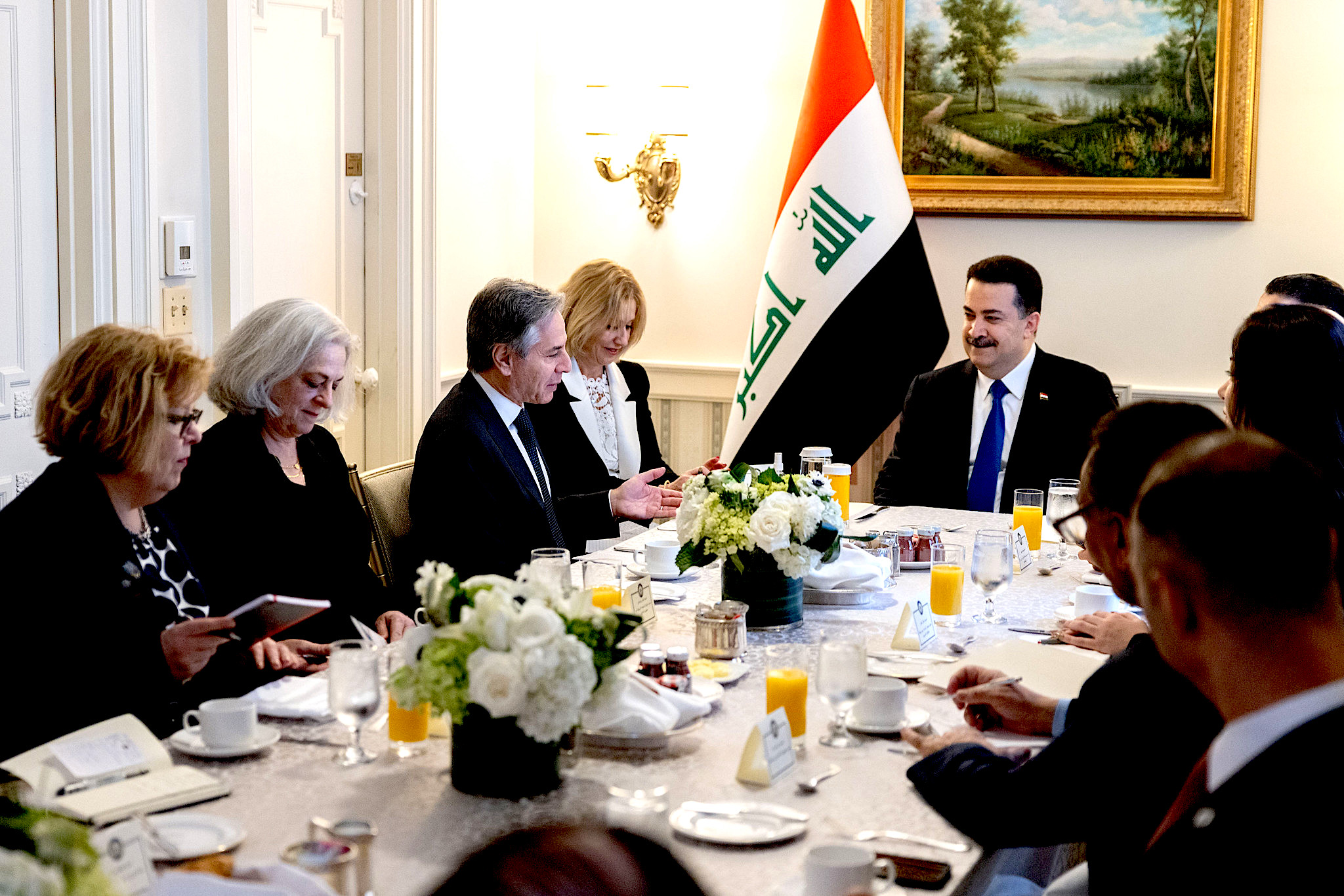Baghdad’s request is part of a global wave of similar shakeups, Damilola Banjo reports.

U.N. Secretary-General António Guterres inspects an honour guard of the U.N. Assistance Mission for Iraq in Baghdad, March 30, 2017. (UN Photo/Samad Al-Safy)
By Damilola Banjo
PassBlue
 The Iraqi government is taking another step toward reducing international influence in its political affairs by requesting that the United Nations Assistance Mission for Iraq (Unami) leave by the end of 2025. The U.N. peace operation was installed in 2003, soon after the American invasion ended.
The Iraqi government is taking another step toward reducing international influence in its political affairs by requesting that the United Nations Assistance Mission for Iraq (Unami) leave by the end of 2025. The U.N. peace operation was installed in 2003, soon after the American invasion ended.
Iraq expects the U.N. political mission to wind down its activities by Dec. 31, 2025, focusing on completing its work in development and transferring relevant files to the Iraqi government. U.N. agencies can stay with provisos.
The request by Iraq follows just days after Somalia suddenly demanded that the 10-year-old U.N. political mission there, called Unsom, end in October 2024. Additionally, the African Union Transition Mission in Somalia, or ATMIS, is slated to exit by the end of December.
Eugene Chen, a former U.N. peacekeeping expert who is a senior fellow at New York University’s Center for International Cooperation, tweeted about the Somalia U.N. mission news, “Another day, another request for a U.N. peace operation to depart.”
Another day, another request for a UN peace operation to depart.
The Security Council needs to walk the talk on the primacy of politics and consider both post-ATMIS options and the role (and configuration) of #UNSOS in light of this development. #Somalia #UNSOM [1/4] https://t.co/3FP4mhsdzt
— Eugene Chen (@telegramwriter) May 10, 2024
The U.N.’s largest peacekeeping mission, Monusco, based in the Democratic Republic of the Congo, is slowly withdrawing from the country, at the request of President Félix Tshisekedi.
The U.N. peace operation in Mali, which over its 10-year life span was the bloodiest mission in the U.N.’s portfolio, was booted out by December 2023. Some development and humanitarian agencies remain, as agreed by the Malian government.
The process for Unami to withdraw from Iraq started last year. In May 2023, the Security Council, which mandated the mission in 2003, approved the creation of an independent review team to assess Unami’s relevance.
The Iraqi Prime Minister Mohammed Shia’ Al Sudani — in a letter sent to U.N. Secretary-General António Guterres marked “Baghdad April 2024” and seen by PassBlue — said the U.N. went outside its bilateral agreement by involving “nonstate actors” in its consultations before the Council resolution endorsed the review team.
The letter said that the team’s review did not distinguish between the government’s perspective and the “personal views” of the nonstate actors, who “did not have a role to play when UNAMI was established in 2003.”
Al Sudani noted that despite his government’s cooperation with the review team, which was led by Volker Perthes, Iraq no longer needed Unami, writing: “The team, like us, concluded that there is no need for the Mission to continue in Iraq.”
(Perthes, a German political scientist, was expelled by Sudan in 2023 at the outbreak of its civil war as Guterres’s special representative and head of its political mission there. He was named to the Unami review team in October 2023.)

Perthes, left, meeting with Guterres in New York on March 13. (UN Photo)
“The Government of Iraq has been able to make several significant strides in many areas, in particular, in areas that are within the mandate of UNAMI,” Al Sudani’s letter to Guterres reads in part. “We call for permanently ending the mandate of the United Nations Assistance Mission for Iraq (UNAMI) on December 31, 2025.”
Yet Al Sudani stressed “the importance of cooperation with the 22 specialized international agencies operating in Iraq through the resident coordinator mechanism” of the U.N. Development Program.
“Iraq has a right to determine its own destiny,” said Stephen Schlesinger, the author of Act of Creation: The Founding of the United Nations. “By calling for the end of the U.N. political mission (UNAMI) in the country after 21 years, Iraq is evidencing a new maturity and strength in governance. The U.N. has done its work; no mission can last forever. Now it is time for the Iraqi government to take back its full democratic authority to lead the nation.”
Unami, based in Baghdad, employs 495 national and 280 international staff. Jeanine Hennis-Plasschaert of the Netherlands has led the mission since December 2018. She announced in February that she would leave her post in May.
The Security Council discussed the mission’s renewal mandate on Thursday [where it received a briefing by Hennis-Plasschaert. While several members endorsed Iraq’s request, the U.S. response was reportedly ambiguous.]

Abbas Kadhom Obaid Al-Fatlawi, charge d’affaires of the Permanent Mission of Iraq to the U.N., during the presentation on Thursday by Hennis-Plasschaert, shown on the computer screens, at the Security Council meeting on Iraq. (UN Photo/Loey Felipe)
“Our understanding is that Iraqis want Unami to end its official mandate by 2024, but the drawdown to be finished by end of 2025,” Samuel Zbogar, Slovenia’s envoy to the U.N., wrote in a text message to PassBlue. (The country is an elected member of the Council.) “The report recommends final ending mid-2026. So there might not be such a difference of views. But we will have to wait until discussion of the Security Council on Thursday.”
Unami was created in August 2003 to foster political dialogue in Iraq and to help coordinate humanitarian and development aid after the 41-day, United States-led invasion ended.
The U.S. ousted Iraqi dictator Saddam Hussein in 2003 and called off major combat on May 1, 2003, but American combat brigades and allied forces’ occupation lasted until 2011, when President Barack Obama withdrew most American troops.
At least 461,000 people were killed in the eight years from 2003 to 2011, with the U.S. spending $3 trillion on the war.
Unami has played supporting roles in enabling Iraq’s post-2003 conflict recovery. It has arranged mediation among Iraqi factions, aided election processes, monitored human rights conditions and coordinated humanitarian assistance in regions affected by conflict, according to the U.N. mission.
Iraq’s request to close the U.N. operation is one step closer to the country’s reducing international interference in its domestic political affairs.
Earlier this year, Al Sudani began the conversation with Washington to have the remaining U.S. troops that were deployed in the country in 2014 to withdraw fully. At least 2,500 U.S. troops were sent to Iraq at the time as part of the global coalition to defeat the Islamic State in Iraq and the Levant (ISIL).

U.S. Secretary of State Antony Blinken, second from left, meeting with Al-Sudani, at head of table, at the Willard Hotel in Washington, D.C., on April 15. (State Department/Chuck Kennedy)
The talks to wind down the U.S. presence have soured as the Israel-Hamas war has significantly hurt the already-fragile relationship between Iraq and the U.S.
In February, the Americans dropped more than 125 precision munitions in Iraq and Syria in retaliation for a Jan. 28 drone attack on a U.S. base in northeastern Jordan. Three U.S. soldiers were killed.
Similarly, the Iraqi government has asked the U.N. investigative team tasked with probing the crimes committed by ISIL to leave by September. The government accused the team of not cooperating with Iraq and asked it to hand over evidence it had gathered before it leaves.
Al Sudani said his country would still work with U.N. specialized agencies, just as Mali’s President Col. Assimi Goïta arranged with the U.N. after its peacekeeping operation, called Minusma, packed up last year.
“We hope that the Security Council will adopt a resolution setting a date for the termination of the mandate of U.N.AMI, in accordance with the request of the Government of the Republic of Iraq,” Al Sudani wrote in his letter.
Damilola Banjo is a reporter for PassBlue. She has a master’s of science degree from the Columbia University Graduate School of Journalism and a B.A. in communications and language arts from the University of Ibadan, Nigeria. She has worked as a producer for NPR’s WAFE station in Charlotte, N.C.; for the BBC as an investigative journalist; and as a staff investigative reporter for Sahara Reporters Media.
Views expressed in this article may or may not reflect those of Consortium News.
Please Donate to the
Spring Fund Drive!



Getying rid of the UN will be easy. Getting rid of Washington will be next to impossible.
What an audacity by US forces to never accept when it’s time to go..looks like the US is the only country on this planet treating all places they violently invade like Hotel California, we check in any time we like but we shall never leave, even when requested to do so! How bizarre, Yankee go home always falls on deaf ears.
Yankee go home
So it begins with the US (UN) being kicked out of countries all over. The only question is weather or not the US will shoot itself in the foot by trying to be all coercive when Donnie Murdo takes over since I can’t believe that Genocide Joe is going to win this fall.